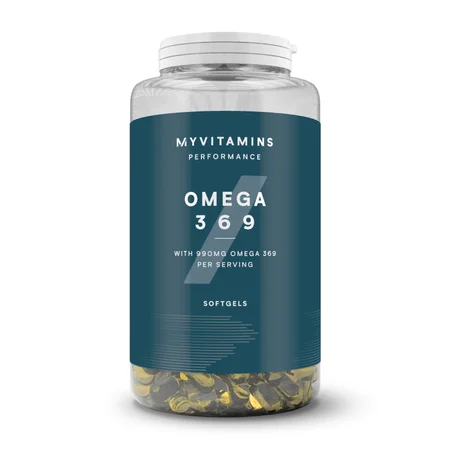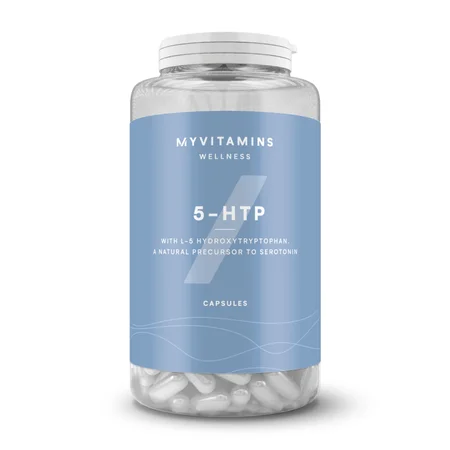
The benefits of 5-hydroxytrytophan, or 5-HTP, are thought to be therapeutic rather than ergogenic. In essence, this substance is more of a pseudo-medication than a supplement, and we'll investigate its potential benefits of using it in this article.
So, strap in and enjoy the biochemical roller coaster which is 5-HTP.
- What is 5-HTP?
- What is Serotonin?
- Why Do I Care About Serotonin?
- 5-HTP Supplements for Weight Loss?
- 5-HTP Supplements As a Sleep Aid?
- Can 5-HTP Supplements Relieve Pain?
- What About Joint Health?
- 5-HTP Supplements | Recommended Dosage
- 5-HTP Supplements | Safety/Side Effects

What is 5-HTP?
5-HTP is not an amino acid. However, it is made from the amino acid L-tryptophan, which naturally occurs in protein foods (e.g. turkey and milk).
5-HTP is not however in the food we eat, and as such needs either to be manufactured from L-tryptophan or consumed as a supplement. It's usually produced from a particular West African herb called Griffonia simplicifolia. This shrub contains approximately 20% 5-HTP which can be sourced for supplement uses.
So why do we want to consume 5-HTP? The answer: serotonin.
What is Serotonin?
You may have heard of serotonin (or 5-hydroxytryptamine), which is a neurotransmitter used by the central nervous system, and has a role in many functions, including sleep regulation, depression and anxiety. It has been described as a “happy chemical” due to its relationship with mood1.
Often, people diagnosed with depression are prescribed a medication called SSRIs (selective serotonin re-uptake inhibitors), which ensure sufficient amounts of serotonin are available for the brain and nervous system to use. These medications in effect stop absorption (or transfer) of serotonin from a synapse (a junction between two nerves) into an adjacent cell, leaving more of the chemical available to bind to receptors.
5-HTP is a precursor to the production of serotonin5, which means it's a required component for its biochemical synthesis in the body. 5-HTP is converted into serotonin via a chemical reaction caused by an enzyme called aromatic L-amino acid decarboxylase (AAAD).
This is important because taking serotonin itself as a medication is not effective, as this neurotransmitter cannot pass the blood-brain barrier and be used by the brain. 5-HTP, however, can pass the brain barrier2.
You can either consume L-tryptophan (which is then converted to 5-HTP, but would cost energy) or to consume 5-HTP itself in supplement form.
Consuming L-tryptophan alone is affected by other amino acids in the intestine during absorption, which uses this amino acid to produce proteins and attenuates its ability to produce serotonin. 5-HTP does not require a transport molecule and as such is not affected the same during absorption.
When taken as an oral supplement, approximately 70% has been found to end up in the blood stream to be converted to serotonin3,4.
Why Do I Care About Serotonin?
The use of 5-HTP as a serotonin booster for anti-depressive therapy has been examined20 but is not strictly our focus here.
Many of the readers of this article are perfectly happy and have lives which do not require an extra serotonin boost. However, anti-depressant properties are only a few of the benefits that have been suggested for 5-HTP.
Studies have researched 5-HTP for diverse problems such as pain disorders, binge eating associated with obesity, and even insomnia.

5-HTP Supplements for weight loss?
A number of sources describe the dietary benefits of consuming 5-HTP to assist weight loss.
For example, one study6 used a double-blind crossover study design to evaluate 19 obese females with BMI scores of between 30 and 40. The participants were either given either a daily 8mg of a 5-HTP supplement per kg of bodyweight, a dose of L-tryptophan or placebo, for 5 weeks. Their diet was otherwise not altered or restricted.
They measured the participants' feeding behaviour using a questionnaire, and their food intake via a 3-day food diary. When they examined their results, they found that 5-HTP both reduced food intake and triggered greater weight loss than placebo.
In fact, they saw a three times greater rate of effectiveness compared to L-tryptophan and placebo. They concluded that the serotonin increase (whilst making no change to mood state) increased satiety (fullness) rather than reduction in appetite.
Further studies
Another study(7) used a similar double-blind study design and evaluated the effectiveness of 900mg 5-HTP daily versus a placebo supplement in a group of 20 obese participants. The researchers followed the groups over 2 consecutive 6 week periods to measure effectiveness over a longer duration of time.
During period one (the first six weeks), they gave no dietary restrictions, and during period two (the second six weeks) they recommended a 1,200kcal diet. Their results were just as striking. They observed firstly a reduction in carbohydrate intake and also early satiety in the 5-HTP group. This led to a reduction of body mass on average of 4.7kg in this 5-HTP group across both periods, which was 4.5% bodyweight reduction. In the placebo group only a 1.3% reduction was seen.
The reduction during period 1 in the 5-HTP group was 1.5%, and in period 2 was 3%, each of which were greater than that seen in the placebo group during the entire trial. In animal studies, food intake has been seen to be dose-dependent to the amount of 5-HTP consumed8; and results have been replicated in trials with participants who had type 2 diabetes9.
Additionally, the mechanism of overeating induced by stress has been found to be reduced by 5-HTP supplementation10, which may highlight the benefits of reducing this negative food-related behaviour to diminish over eating therapeutically11.
5-HTP supplements as a sleep aid?
It's widely recognised that various neurotransmitters (including serotonin) assist modulation of our sleep cycle. Early evidence has suggested that serotonin, specifically, may influence our ability to fall asleep.
Mostly, studies describe how serotonin assists our ability to stay awake and function while awake. Serotonin works with other chemicals, such as acetylcholine and noradrenaline, to promote brain responsiveness, and inhibits the parts of the brainstem which promote sleep12.
Why 5-HTP, which boosts serotonin, as a sleep aid?
Other studies demonstrate that if you use a chemical called parachlorophenylalanine (PCPA) to reduce brain levels of serotonin, then the result is insomnia13. Further studies show that this effect can be reversed by consumption of 5-HTP14.
This can be explained due to the relationship between serotonin and a specific phase of our sleep cycle: REM sleep. REM, which stands for rapid eye movement, sleep is a component of our sleep cycle characterised by random movements of the eyes and REM atonia (which is normal muscle paralysis during sleep). This is also the stage where we dream most vividly and dreams following consumption of 5-HTP are often reported to be very clear.
REM sleep deprivation can lead to depression, anger and eating disorders(16). It usually comprises between 5-20% of our sleep cycle17.
However, research has previously shown that taking 5-HTP can cause an increase in the duration of REM sleep from 5% of the entire cycle to 53%17.
The absolute muscle relaxation which occurs during this stage means better recovery and feelings of wakefulness upon getting out of bed. In a way, it allows us to fully prepare for being awake, as such improving our behavioural and physiological process efficiency when awake.
5-HTP also has also been shown in scientific studies to have additional sleep-related benefits. These include reducing the time required to get to sleep18, reducing the number of times you awake at night(18), increasing the duration of sleep, and improving the quality of sleep19.
Can 5-HTP supplements relieve pain?
Another therapeutic role for 5-HTP is in the potential reduction of symptoms of fibromyalgia. Fibromyalgia is a musculoskeletal disorder characterised by diverse and varied areas of pain, fatigue and stiffness. There are also components of sleep disturbance and emotional or psychological issues.
However, fibromyalgia is also a label placed upon individuals who present with a varied but distinct set of symptoms and on examination have multiple tender points21. It is what may be described as an “umbrella diagnosis” as a syndrome of symptoms.
Recently, neurophysiological research has suggested that fibromyalgia is essentially similar to a number of chronic pain disorders which are due to a neurophysiological phenomenon called central sensitisation22,23. This, in very brief terms, is where changes occur in your nervous system which means it becomes more sensitive to stimuli. Increased pain in the absence of a specific nociceptive (pain causing) stimulus is a subsequent result.
Clinical studies have previously shown benefits for significant improvements in reducing pain, stiffness, anxiety and fatigue with 5-HTP24,25.
What about joint health?
Figures from the International Association of the Study of Pain state that 22.7% of all people have 'doctor-diagnosed' arthritis, 9.8% of which limit their daily activities in some way26. This can be broken down further to show 10-15% have osteoarthritis (8.5 million people in the UK), and 1% whom have systemic rheumatoid arthritis.
Animal model studies have examined the effect of 5-HTP on joint damage from arthritis, and indicate a reduction in disease activity and inflammation27. This demonstrates interesting potential for the use of this substance to battle a globally prevalent and common condition and prevent development of musculoskeletal joint disorders.
Whilst very preliminary in nature, findings such as these provide another benefit of 5-HTP supplementation which may evolve in the future with further scientific investigation.
5-HTP supplements dosage
An effective dose for the majority of individuals examined sits between 300-900mg per day.
In experimental studies, the average dose described is 200-300mg, which is always divided into three measures throughout the day5.
The greatest range of dosages is for depression where doses as low as 20mg and as high as 2400mg are used28,29.
Dosages for weight loss are between 300mg9 and 900mg7. However, a more accurate estimate could be made using the approximation of 8mg per kg of body weight per day6.
To aid sleep a dose of 600mg over three measures is deemed best15.
Whereas for fibromyalgia symptoms, studies are quite consistent and advise a dose of 300mg per day24,25.
5-HTP side effects
Over the course of an approximate 20 year period, despite global sale and consumption of 5-HTP supplements (as well as an abundance of scientific studies providing 5-HTP therapeutically) there is no evidence of safety and toxicity of this compound30.
Additionally, rats fed a peak (maximum) dose for a whole year showed no negative physiological manifestations. However, as this supplement seems to have a genuine role on the central nervous system health and function, some specific considerations should be made.
1) This article is not intended to suggest that clinical depression should be treated by over the counter 5-HTP supplementation. If you are worried or anxious about your health, please go to the GP to discuss any issues. 5-HTP may be an effective form of anti-depressant, but its suitability to you specifically would need to be assessed by your GP.
2) If you are taking any psychoactive drugs (prescribed or otherwise) do not take 5-HTP unless cleared by a doctor.
3) Side effects can occur including gastrointestinal discomfort and nausea, which lessen or cease after longer periods of use. Sporadically it may also cause headaches or heart palpitations5. If you feel symptoms are beyond your tolerance level, simply stop taking your supplement and the symptoms will stop.
4) Very long term use (many months/years) has been known to upset the balance of specific chemicals in the nervous system (such as dopamine, norepinephrine and epinephrine)29,31.
Take home message
5-HTP supplements are widely used to improve sleep or as a dietary aid to assist weight loss, however, studies have previously demonstrated a vast array of benefits of this compound through facilitation of serotonin in our bodies.
If you feel 5-HTP may be of benefit to you, start with 100mg three times per day as a trial. Increase the dosage up to approximately 8mg per kg of your bodyweight, divided into three measures. Use for a couple of months and then take a break.
READ THESE NEXT:

11 Ways To Break A Weight Loss Plateau
A break from your diet could be what's needed....

Do Collagen Supplements Work? What Is The Best Type?
Find out what collagen can do for you....

Dawid Lyszczek is an expert new product developer, food technologist, nutritionist and personal trainer. He holds a bachelor’s degree in Human Nutrition, master’s degree in Food Innovation and Level 3 Certificate in Personal Training. Dawid specialises in evidence-based body-composition nutrition and training for both amateurs and physique athletes, and has been involved in sports nutrition and weight training for over 15 years. Dawid is also a former competitive bodybuilder, UKBFF British finalist in “Intermediates Over 90kgs” Class of 2013, as featured in Flex magazine.
Dawid’s academic area of interest has involved both the role of meal frequency on body composition, and also functional food development, which you can find out more about here.
In his current role, Dawid bridges the gap between sports nutrition and food technology, bringing in academic experience backed by real life practice that produces results.
You can find out more about Dawid’s experience here.
1. Young SN (2007). “How to increase serotonin in the human brain without drugs”. Rev. Psychiatr. Neurosci. 32 (6): 394–99. http://www.sciencedirect.com/science/article/pii/S030105111200230X
2. Birdsall, T. C. (1998). 5-Hydroxytryptophan: a clinically-effective serotonin precursor. Altern Med Rev 3, 271–280. http://www.altmedrev.com/publications/3/4/271.pdf
3. Magnussen IE, Nielsen-Kudsk F. Bioavailability and related pharmacokinetics in man of orally administered L-5-hydroxytryptophan in a steady state. Acta Pharmacol Toxicol 1980;46:257-262. http://www.ncbi.nlm.nih.gov/pubmed/6966118
4. Magnussen I, Jensen TS, Rand JH, Van Woert MH. Plasma accumulation of metabolism of orally administered single dose L-5- hydroxytryptophan in man. Acta Pharmacol Toxicol 1981;49:184-189. http://www.ncbi.nlm.nih.gov/pubmed/6175178
5. Turner, E.H., Loftis, J.M. and Blackwell, A.D., 2006. Serotonin a la carte: supplementation with the serotonin precursor 5-hydroxytryptophan. Pharmacology & therapeutics, 109(3), pp.325-338. http://www.anth.ucsb.edu/faculty/blackwell/Documents/5-HTP.Pharm.Therap.pdf
6. Ceci, F., Cangiano, C., Cairella, M., Cascino, A., Del Ben, M., Muscaritoli, M., Sibilia, L. and Fanelli, F.R., 1989. The effects of oral 5-hydroxytryptophan administration on feeding behavior in obese adult female subjects. Journal of neural transmission, 76(2), pp.109-117. http://www.ncbi.nlm.nih.gov/pubmed/2468734
7. Cangiano, C., Ceci, F., Cascino, A., Del Ben, M., Laviano, A., Muscaritoli, M., Antonucci, F. and Rossi-Fanelli, F., 1992. Eating behavior and adherence to dietary prescriptions in obese adult subjects treated with 5-hydroxytryptophan. The American journal of clinical nutrition, 56(5), pp.863-867. http://www.ncbi.nlm.nih.gov/pubmed/1384305
8. Ju CY, Tsai CT. Serotonergic mechanisms involved in the suppression of feeding by 5-HTP in rats. Chin J Physiol 1995;38:235–40. http://www.ncbi.nlm.nih.gov/pubmed/8925676
9. Cangiano C, Laviano A, Del Ben M, Preziosa F, Angelico F, Cascino A, et al. Effects of oral 5-hydroxy-tryptophan on energy intake and mac- ronutrient selection in non-insulin dependent diabetic patients. Int J Obes Relat Metab Dis 1998;22:648–54. http://www.ncbi.nlm.nih.gov/pubmed/9705024
10. Amer, A., Breu, J., McDermott, J., Wurtman, R.J. and Maher, T.J., 2004. 5-Hydroxy-L-tryptophan suppresses food intake in food-deprived and stressed rats. Pharmacology Biochemistry and Behavior, 77(1), pp.137-143. http://www.ncbi.nlm.nih.gov/pubmed/14724051
11. Halford JC, Blundell JE. Pharmacology of appetite suppression. Prog Drug Res 2000;54:25–58. http://www.ncbi.nlm.nih.gov/pubmed/10857385
12. Portas, C.M., Bjorvatn, B. and Ursin, R., 2000. Serotonin and the sleep/wake cycle: special emphasis on microdialysis studies. Progress in neurobiology, 60(1), pp.13-35. http://www.ncbi.nlm.nih.gov/pubmed/10622375
13. Wyatt, R.J., Engelman, K., Kupfer, D.J., Scott, J., Sjoerdsma, A. and Snyder, F., 1969. Effects of para-chlorophenylalanine on sleep in man. Electroencephalography and clinical neurophysiology, 27(5), pp.529-532. http://www.ncbi.nlm.nih.gov/pubmed/4187039
14. Wyatt, R. J. Serotonin and sleep. In A. SJOERDSMA (Ed.), Serotonin now: clinical implications of inhibiting its” syntheses with parachlorophenylalanine. Ann. intern. Med., 1970, 73:607 629. http://www.ncbi.nlm.nih.gov/pubmed/4319081
15. Wyatt, R.J., Zarcone, V., Engelman, K., Dement, W.C., Snyder, F. and Sjoerdsma, A., 1971. Effects of 5-hydroxytryptophan on the sleep of normal human subjects. Electroencephalography and clinical neurophysiology, 30(6), pp.505-509. http://www.ncbi.nlm.nih.gov/pubmed/4105646
16. Ellman, S.J., Spielman, A.J., Luck, D., Steiner, S.S. and Halperin, R., 1978. REM deprivation: a review. In The mind in sleep (pp. 419-457). Erlbaum Hillsdale, NJ.
17. Horne, J., 2013. Why REM sleep? Clues beyond the laboratory in a more challenging world. Biological psychology, 92(2), pp.152-168. http://www.ncbi.nlm.nih.gov/pubmed/23174692
18. Monti, J.M., 2011. Serotonin control of sleep-wake behavior. Sleep medicine reviews, 15(4), pp.269-281. http://www.ncbi.nlm.nih.gov/pubmed/21459634
19. Shell, W., Bullias, D., Charuvastra, E., May, L.A. and Silver, D.S., 2010. A randomized, placebo-controlled trial of an amino acid preparation on timing and quality of sleep. American journal of therapeutics, 17(2), pp.133-1. http://ptloffice.com/downloads/marketing/GABAdone20paper20May202009.pdf
20. Meyers S. Use of neurotransmitter precursors for treatment of depression. Altern Med Rev. 2000;5(1):64–71. http://www.ncbi.nlm.nih.gov/pubmed/10696120
21. Tomas-Carus, P., Branco, J.C., Raimundo, A., Garcia, J., Sousa, P.M. and Biehl-Printes, C., 2015. [Relationships between widespread pain and thresholds pain tolerance on tender points in Portuguese women with fibromyalgia: impact on daily life.]. Acta reumatologica portuguesa. 40, 3, 254-61. http://www.ncbi.nlm.nih.gov/pubmed/25941898
22. On, A.Y., 2016. Fibromyalgia or chronic widespread pain: Does it matter?. Itch & Pain, 3. http://www.google.com/url?url=http://www.smartscitech.com/index.php/IP/article/download/1079/pdf_12&rct=j&frm=1&q=&esrc=s&sa=U&ved=0ahUKEwj0ue7XhsrKAhWFpw4KHcQ4BOEQFggZMAE&usg=AFQjCNEhqB5H86B8WifBEB6qB5mfhI96VQ
23. Mosely L. (2014) Everything you wanted to know about CENTRAL SENSITISATION. Body in Mind. http://www.bodyinmind.org/central-sensitisation/
24. Caruso, I., Puttini, P.S., Cazzola, M. and Azzolini, V., 1990. Double-blind study of 5-hydroxytryptophan versus placebo in the treatment of primary fibromyalgia syndrome. Journal of International Medical Research, 18(3), pp.201-209. http://imr.sagepub.com/content/18/3/201.full.pdf
25. Puttini, P.S. and Caruso, I., 1992. Primary fibromyalgia syndrome and 5-hydroxy-L-tryptophan: a 90-day open study. Journal of international medical research, 20(2), pp.182-189. http://www.ncbi.nlm.nih.gov/pubmed/1521674
26. Neogi, T., 2016. Joint Pain Epidemiology. http://iasp.files.cms-plus.com/Content/ContentFolders/GlobalYearAgainstPain2/2016/FactSheets/English/11.%20Joint%20Pain%20Epidemiology.pdf
27. Yang, T.H., Hsu, P.Y., Meng, M. and Su, C.C., 2015. Supplement of 5-hydroxytryptophan before induction suppresses inflammation and collagen-induced arthritis. Arthritis research & therapy, 17(1), pp.1-12. http://www.arthritis-research.com/content/pdf/s13075-015-0884-y.pdf
28. Hinz M, Stein A, Uncini T. The discrediting the monoamine hypothesis: a case study. Int J Gen Med. 2012;5:135–142. http://www.ncbi.nlm.nih.gov/pmc/articles/PMC3282597/
29. Hinz M, Stein A, Uncini T. Relative nutritional deficiencies associated with centrally acting monoamines. Int J Gen Med. 2012;5:413–430. http://www.ncbi.nlm.nih.gov/pubmed/22615537
30. Das, Y.T., Bagchi, M., Bagchi, D. and Preuss, H.G., 2004. Safety of 5-hydroxy-L-tryptophan. Toxicology letters, 150(1), pp.111-122. http://www.ncbi.nlm.nih.gov/pubmed/15068828
31. Hinz M, Stein A, Uncini T. APRESS: apical regulatory super system, serotonin, and dopamine interaction. Neuropsychiatr Dis Treat. 2011;7:457–463. http://www.ncbi.nlm.nih.gov/pmc/articles/PMC3157489/






